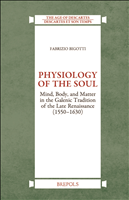Physiology of the Soul : Mind, Body and Matter in the Galenic Tradition of the Late Renaissance (1550-1630)
366 p.
This study looks at the ways in which physicians and philosophers developed Galen's philosophical legacy at the end of the Renaissance, and shows how their reading of classical medical texts moved beyond accepted patterns and conventions. By challenging a traditional historiographical account that described Renaissance Galenism in terms of decline and fall, this study argues for a new assessment of Galen's legacy, also read through the lens of those who opposed or reacted critically to it and thus contributed to the shaping of important aspects of the early modern debate on anthropology, ethics, psychology and even quantified experimentation. Among these many innovations and transformations, the notion of 'ingenuity' (ingenium) deserves particular attention. Hidden within this corporeal, inherent and heritable inclination, two major themes that side disquietingly with the development of modern subjectivity can be identified: the 'corporeality of the body', and the common destiny of humans and animals.More gen
erally, this study offers a contribution to the ongoing debate on the role and value of medical history, arguing in favour of the concept of 'historical translatability' in balancing the longue durée of traditions with the chaotic interactions of individual thinkers. [Publisher's text].
Special access authorizations may apply; please contact us for further information.
-
Information
ISBN: 9782503581668
SERIES


